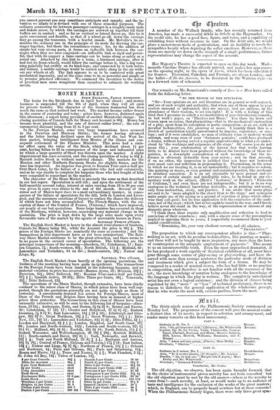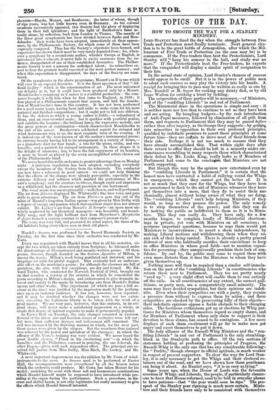a I t.
The thirty-ninth season of the Philharmonic Society commenced on Monday last. The programme of the concert will give the musical reader a distinct idea of its merits in respect to selection and arrangement, and render many remarks on this head unnecessary.
CART I.
Sinfonia in D, No. 2.
Aria, "Ah, gig trascorse il dl,"(Zelmira,)Mr.Whitworth Septett, Op. 20, for Violin, Viola, Violoncello, Contra- basso, Clarinet, Bassoon, and Horn; Messrs. Sainton, Hill, Lucas, Howell, Williams, Baumann, and C
Harper Aria, "Amor nel mio penar, (Flack,,) Miss Dolby
Overture, " Oberon."
PART II.
Siofonia in C minor, No. 1 Mendelssolin.
Aria, " Se it nostro pianto, (II Seraglio,) Mr. Lockey Mozart. Duetto, "Ah, to non sai,"(lfargherita crAttjou,) Miss
Dolby and Mr. Whitworth Meycrbcer.
Overture, "Leonora-Fidelio." Beethoven.
Conductor, Mr. Costa.
The old objection, we observe, has been again brought forward, that in the choice of instrumental pieces novelty has not been consulted • but the old objection must be met by the old answer—where is the novelty to come from?—such novelty, at least, as would make up to an audience of taste and intelligence for the exclusion of the works of the great masters ; which, in England, can be properly heard nowhere but at these concerts? When the Philharmonic Society began, there were only three great sym-
Mozart. Rossini.
Beethoven. Handel. Weber.
phonista—Haydn, Mozart, and Beethoven ; the latter of whom, though of ripe years, was but little known even in Germany. As his colossal creations successively appeared, this Society had the glory of displaying them in their full splendour; and the light of Beethoven's fame ac- tually shone, by reflection, back from London to Vienna. The mantle of the three great symphonists has been divided between Spohr and Men- delssohn : their works have been adopted, immediately on their appear- ance, by the Philharmonic Society, for which some of them have been expressly composed. Thus has the Society's repertoire been formed, and experience has shown that it must be very rarely departed from ; for, when- ever a symphony by a second-rate author, whether foreign or English, is introduced into a concert, it never fails to excite murmurs from the au- dience, disappointed of one of their established favourites. The Philhar- monic Society is not a nursery for unfledged talent; its subscribers ex- pect to hear the greatest works executed in the most perfect manner ; and when this expectation is disappointed, the days of the Society are num- bered.
Of the symphonies in the above programme, Mozart's in D is one which will ever be an especial favourite. It is the finest specimen of that " dif- ficult facility" which is the consummation of art. The most unlearned ear delights in it, but it could have been produced only by a Mozart. Mendelssohn's symphony in C minor is a youthful production : the com- poser brought it with him when he first came to England, in 1829 ; it was played at a Philharmonic concert that season, and laid the founda- tion of Mendelssohn's fame in this country. It has not been performed for a good many years, having been laid aside to make room for his more matured and finished compositions ; but it ought not to fall into oblivion. It has the defects to which a young author is liable,—a redundancy of ideas, and an over-crowded score ; but it sparkles with youthful genius, and exhibits the beauties—the brilliant fancy, the expressive melody, and the great powers of combination—which characterized Mendelssohn to the end of his career. Beethoven's celebrated septett for stringed and wind instruments was, to us, the most exquisite treat of the evening. It is indeed one of the best-known of all the author's instrumental pieces ; its extreme beauty having led to its arrangement in a variety of forms,— as a pianoforte duet for four hands ; a trio for the piano, violin, and vio- loncello ; and a quintett for stringed instruments. In these shapes it is the delight of amateurs ; but, to have the full enjoyment of its beauties, it must be heard as played by the seven accomplished artists chosen out of the Philharmonic band.
We never heard this noble orchestra to greater advantage than on Monday night. A judicious regulation has been adopted, excluding everybody except the members of the Society from the rehearsals. The conductor can now have a rehearsal in good earnest : we could not help thinking that the effects of the change were already perceptible, especially in the extreme delicacy and softness which marked the performance of Mo- zart's symphony; and the overture to Oberon, though rapid and impetuous as a whirlwind, had the clearness and precision of one instrument. The vocal music was unexceptionable—well chosen, and well performed. The air from Zelmira displayed Mr. Whitworth's fine bass voice and pure style to great advantage. The air from Flavio—a gem dug out of the mine of Handel's forgotten Italian operas—was given by Miss Dolby with a degree of energy and passion which that excellent singer does not always exhibit. Mr. Lockey's air from Mozart's Il Seraglio—an opera most un- wisely neglected by our theatrical managers—was beautiful, and beauti- fully sung ; and the light brilliant duet from Meyerbeer's Ifarghtrita d'Anjon formed a curious contrast to that composer's present style.
The room was very full, and presented its usual aspect, the faces of the old habitues being everywhere seen in their old places.



























 Previous page
Previous page